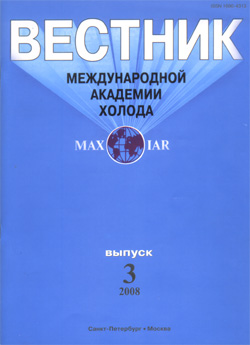
Experimental research of refrigerating system effective radiation into space

Annotation
Alternative energy sources are of great importance due to introduction of energy efficient and green technologies. Effective radiation into space is one of the important renewable energy sources for a refrigerating system. Experimental research is carried out to investigate the possibility of effective energy application in refrigerating engineering. Three experimental units are described. The first one is used to determine night sky temperature. The second one is used to determine the influence of radiating surface slope angle on cooling effect value. The difference between the temperature of angled surface and the one of horizontal surface is shown to be from 1 to 1.5 К on the average. The third unit is used to analyze cooler refrigerating capacity. The cooler consisted from steel sheets and a plastic piping is shown to be ineffective and need updating. For the first and second units graphs of air and radiating surface temperature changes are given. For the third unit thermal balance calculations are given. The effective radiation effect on ice temperature is investigated at Medeu outdoor skating. The ice temperature is found to be, on the average, 10 K lover than the air temperature. Refrigerating systems with effective radiation are experimentally shown to enable cold accumulating during the night. Then, they can be used in refrigerating units in storage rooms for fruits and vegetables during day time; in air conditioning systems; and to take the swings at processing plants and outdoor skating.
Keywords
Постоянный URL
Articles in current issue
- Impact of saccharification method on barley mash fermentation parameters and quality of fermented mash
- Innovative technology of canned pear compote for baby food
- The use of transglutaminase in milk processing
- The optimization of fish-plant snacks formula
- Study of the process of freezing and thawing out of the fruit juices
- Experimental research of refrigerating system effective radiation into space
- Exergetic analysis of LNG regasification techniques
- Background for the use of gas-static bearings in screw compressors
- Organizational aspects of red blood cells cryopreservation in the activities of blood service in Russian Federation
- The use of axial-radial impellers in halocarbon refrigeration centrifugal compressors
- Pilot study of Ekokhol 1 ozone-safe mix with the use of mineral refrigerating oil
- Generalization of data on second virial coefficient of methane and its fluoroderivatives
- Optimization of parameters of process of receiving biofuel by methods of mathematical modeling
- Thermal conductivity of mixtures of the rarefied gaseous hydrofluorocarbons
- Measurement of polymeric composite materials radiation coefficient
- Tendencies and dynamic of non-liner climatic changes under the influence of solar constant and Bond's albedo long-term variations
